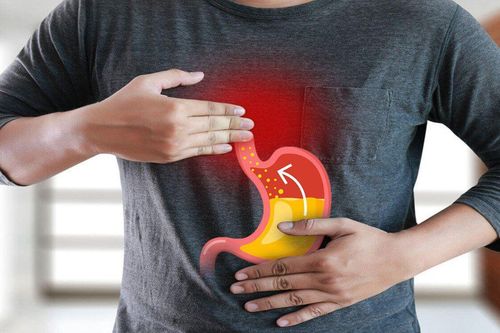This article was professionally consulted by Master, Doctor Vu Tan Phuc - Gastroenterologist - Department of Examination & Internal Medicine - Vinmec Phu Quoc International General Hospital.
Stomach acid plays an important role in digestive function. Stomach acid imbalance, specifically excess stomach acid, can lead to many dangerous diseases such as stomach ulcers, stomach bleeding, ... if not detected and treated early.
1. The role of gastric acid
The main component of gastric acid is hydrochloric acid (chemical formula: HCl). The concentration of HCl in the stomach of a healthy person ranges from 0.0001 - 0.001 mol/l, the pH is about 3 - 4.
Gastric acid plays an important role in the digestive system. That is:
- Promoting the digestion of food and emptying the stomach;
- Stimulating the small intestine and pancreas to produce digestive enzymes to break down fats, proteins, etc.;
- Destroying harmful bacteria from the outside entering the stomach, avoiding negative effects on the digestive system;
- Playing an important role in the opening and closing of the cardiac and pyloric valves.
Gastric acid needs to be balanced to stabilize the digestive process in the stomach. A lack or excess of gastric acid negatively affects the digestive function of the stomach in particular and health in general.
Trắc nghiệm: Làm thế nào để bảo vệ lá gan khỏe mạnh?
Làm test trắc nghiệm kiểm tra hiểu biết về gan có thể giúp bạn nhận thức rõ vai trò quan trọng của gan, từ đó có các biện pháp bảo vệ gan để phòng ngừa bệnh tật.2. What is excess stomach acid? Causes - symptoms of the disease
2.1 What is excess stomach acid?
When the concentration of stomach acid exceeds 0.001 mol/l and the pH is below 3.5, it will lead to excess stomach acid. This is a common condition that can negatively affect the stomach, leading to many dangerous diseases.
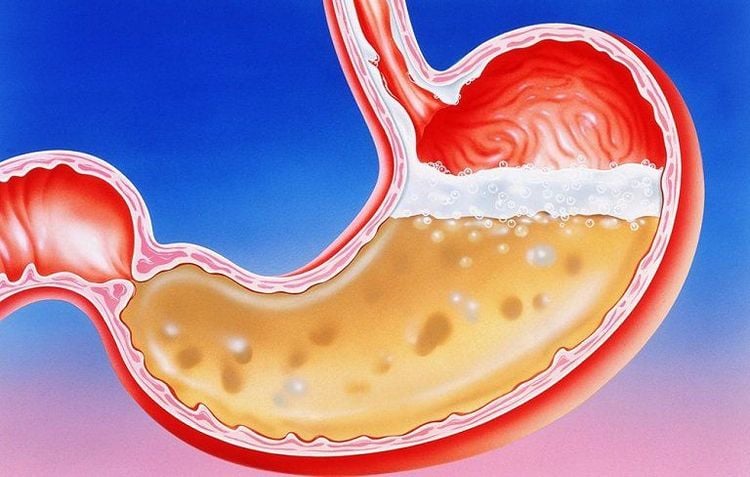
2.2 Causes of excess stomach acid
Alcohol and beer abuse: Alcohol and beer inhibit the formation of mucus that protects the stomach lining, while stimulating the secretion of more gastric acid, which can easily damage the stomach lining. People who drink too much alcohol often have high levels of stomach acid, causing severe damage to the inflammation, which can cause ulcers, stomach perforation, and even lead to stomach cancer;
Irregular eating: Eating at irregular times, skipping meals, and frequently eating greasy foods are also causes of increased gastric acid secretion, leading to excess gastric acid;
Nervous tension: Causes the stomach to contract, secrete more acid, leading to excess gastric acid, stomach pain;
Helicobacter Pylori bacteria: The presence of Helicobacter Pylori bacteria in the stomach increases acid secretion, causing many diseases in the stomach;
Smoking: Nicotine in cigarettes can destroy beneficial bacteria in the stomach, creating a favorable environment for harmful bacteria to grow, especially Helicobacter Pylori bacteria, causing increased gastric acid secretion;
Lack of sleep: Staying up too late and not getting enough sleep are causes of increased gastric acid secretion.
2.3 Symptoms of excess gastric acid
- Pain and burning sensation in the epigastrium;
- Bloating, heartburn, sour mouth, bad breath;
- Diarrhea or constipation, prolonged dark urine;
- Dry skin, many pimples;
- Frequent fatigue, insomnia;
- Nausea, difficulty concentrating and nervous tension.
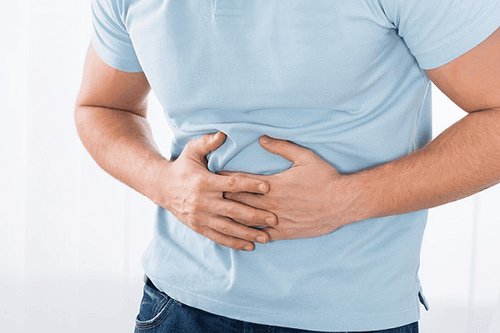
3. Is excess stomach acid dangerous?
Excess stomach acid is a dangerous condition. The reason is that a sufficient amount of acid will help digest food, but if there is excess acid, it will destroy and erode the stomach wall and organs in the digestive system. Over time, the acid will cause deeper damage to the stomach lining, causing diseases such as:
Stomach pain: Excess stomach acid damages the lining, causing ulcers on the stomach lining, causing stomach pain;
Gastroesophageal reflux: Excess gastric acid can reflux into the esophagus, damaging this organ;
Gastric ulcers: Long-term gastritis will be attacked by excess acid, causing ulcers on the stomach lining;
Gastrointestinal bleeding: Excess acid in contact with ulcers can cause stomach bleeding;
Gastric perforation and stomach cancer: These are the most serious complications of the disease.
In addition, excess stomach acid also corrodes the body, causing the body to lose resistance, making it susceptible to chronic diseases such as gout, osteoporosis, cancer, kidney stones, obesity, liver and gallbladder diseases, etc.
4. Treatment of excess stomach acid
4.1 Use of drugs to reduce stomach acid secretion
Currently commonly used drugs to reduce stomach acid secretion and reduce the negative effects of acid on the stomach lining are ranitidine, omeprazole, cimetidine, lansoprazole, etc. Drugs that help neutralize excess acid and increase pH include alusi, maalox, gastropulgite, etc.
When the drug is introduced into the body, the active ingredients in the drug will dissolve in the digestive system and enter the blood. They can cause some side effects such as allergies, headaches, nausea, etc. Therefore, patients should pay attention not to arbitrarily use drugs to reduce stomach acid but should take the drug as prescribed by a specialist to avoid possible side effects.
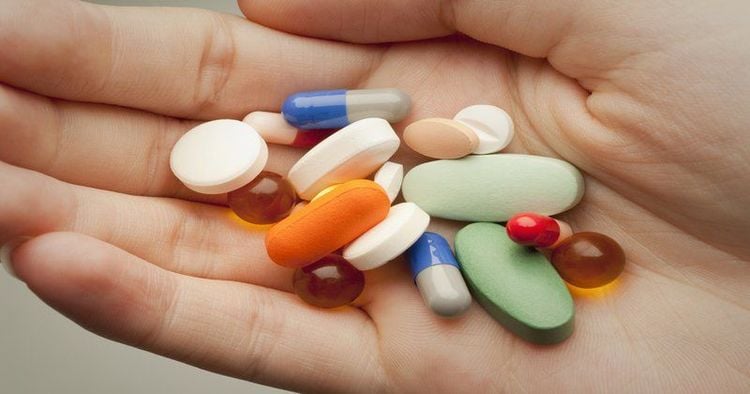
4.2 Maintain healthy living and eating habits
Eat dinner on time, preferably 3-4 hours before going to bed;
Do not eat too much before going to bed because this will put pressure on the stomach to work harder;
Avoid eating sour and spicy foods such as chili, vinegar, pickles, etc. to avoid stomach erosion;
Divide meals during the day, eat in appropriate amounts;
Eat slowly, chew thoroughly;
Stay away from drinks containing stimulants such as beer, wine or carbonated drinks;
Quit smoking;
Get enough sleep, avoid staying up late;
Drink a glass of water every morning to clean the intestines, eliminate harmful substances from the body;
Avoid stress, keep a comfortable and optimistic mind.
4.3 Use foods that help reduce stomach acid
There are some healthy foods that do not stimulate the production of stomach acid, reduce inflammation of the esophagus and stomach, and provide enough nutrients for the body. Foods that can be mentioned include:
- Green leafy vegetables: Kale, spinach contain many antioxidants and vegetable fiber that are very good for the digestive system;
- Artichoke: Helps support digestion;
- Bell peppers: Rich in vitamin C, increase the body's resistance, fight against infectious agents;
- Garlic: The active ingredient allicin in garlic has the ability to kill bacteria and reduce the formation of acid. Therefore, to reduce stomach acid, patients can chew 2 - 3 cloves of garlic per meal;
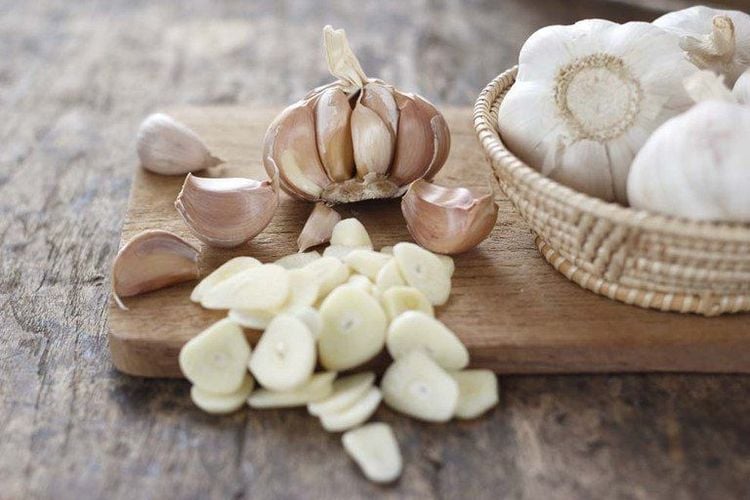
- Whole grains: Millet, oatmeal, brown rice, flax seeds, ... are rich in fiber, very good for digestion;
- Bananas: Alkaline, help neutralize stomach acid. Each person should eat 1 - 2 ripe bananas every day because it is very beneficial for the digestive system and general health;
- Watermelon: Eating a few slices of watermelon or drinking a glass of watermelon juice every day will help reduce stomach acid secretion, prevent heartburn, reflux;
- Vegetable oils: Including flaxseed, canola, soybean, sunflower, ... They are rich in Omega-3 and Omega-6, which help fight inflammation, neutralize acid and create a protective barrier for the stomach lining;
- Other foods: Salmon, sardines, mackerel, tuna, poultry, almonds, walnuts, zucchini, apples, guava, etc.
4.4 Some tips to reduce stomach acid with natural ingredients
Ginger root: Ginger has anti-inflammatory, pain-relieving, stomach acid-neutralizing effects, improving reflux and indigestion due to excess acid. To treat excess stomach acid, patients should eat 2-3 slices of fresh ginger every day or drink ginger tea;
Turmeric root: Turmeric contains a lot of curcumin, which helps neutralize stomach acid, protects cells in the stomach from corrosion, and prevents ulcers and gastroesophageal reflux. To reduce stomach acid, patients should mix 120g of turmeric powder with 60g of honey, roll into small balls the size of corn kernels, take 3 balls each time, 3 times a day and use for at least 10 consecutive days;
Honey: contains high levels of vitamin C, E and minerals calcium, zinc, potassium, which help balance the pH in the stomach, reduce acid production and prevent damage caused by excess stomach acid. To reduce stomach acid with honey, patients should drink 1 spoon of honey in the morning and evening 15 minutes before eating or add 2 spoons of honey to chamomile tea, drink 3 small cups a day. Stomach acid helps digest food, allowing the body to absorb necessary nutrients. However, excess stomach acid will cause health problems. Therefore, everyone needs to know how to neutralize stomach acid by maintaining a healthy diet and lifestyle.
To arrange an appointment, please call HOTLINE or make your reservation directly HERE. You may also download the MyVinmec app to schedule appointments faster and manage your reservations more conveniently.





